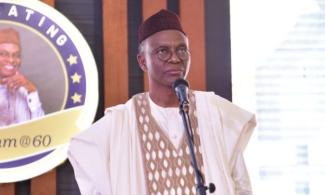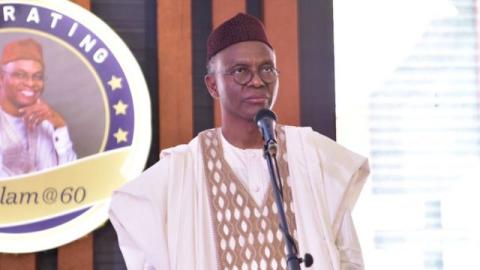
The comments, which have gone viral on social media, contradict his recent stance that his government will not negotiate or pay ransom to bandits even if his child is kidnapped.
Kaduna state governor, Nasir El-Rufai has reacted to the comments he made in 2014 on the need to negotiate with kidnappers and do whatever it takes to rescue abducted citizens.
The comments, which have gone viral on social media, contradict his recent stance that his government will not negotiate or pay ransom to bandits even if his child is kidnapped.

El-Rufai had in 2014 criticised the administration of ex-President Goodluck Jonathan shortly after Boko Haram insurgents abducted students of Government Girls Secondary School, Chibok, Borno State.
He had said Jonathan was insensitive to the plights of the kidnapped girls, calling on the Nigerian government to pay negotiate with Boko Haram terrorist and do whatever it took to facilitate their freedom.
The video has sparked an outrage amidst mixed reactions, which have continued to trail the ongoing attacks and abductions of students and others in Kaduna State.[story_link align="left"]93405[/story_link]
He had said, “If one of these girls was Jonathan’s daughter, the story would have been different.
“The only reason why these girls are still in captivity is because they are not the daughter of any important Nigerian and we know it.
“If you say we are politcising terrorism, go and rescue the girls so that I will not have the basis to politicise it.”
Asked if he was in support of negotiation, he had responded, “I am in support of every option, when you have life of a citizen at risk, you should not have any option on the table. You should reflect and listen.”
The governor, now being taunted on social media, said it is prudent to review one’s position when the facts change.
In a statement by his Special Adviser on Media and Communication, Muyiwa Adekeye, El-Rufai insisted that his administration would not offer ransom to kidnappers, saying that doing so had not curbed criminality in the country.
The statement read, “Those pushing that kind of narrative are sharing a video clip of a 2014 interview in which Malam Nasir El-Rufai called on the government of President Goodluck Jonathan to use all options, including negotiation, to rescue the Chibok girls. The years since 2014 may have led some people to forget the denial and doubt that defined the FG’s response to the Chibok abductions, especially the initial refusal to acknowledge that it happened. That was the context under which civic pressures were brought on the government.
“Nigeria’s journey since the 2014 Chibok tragedy has proven that the solution to violent crimes, including terrorism and banditry, is a robust response from the state and its coercive agencies. The quantum of money paid as ransom following many negotiations with bandits have not stopped kidnappings, reduced their frequency or deterred the criminals.
“The experience of many states in the Northwest of Nigeria since 2015 has included cattle rustling, kidnappings, killings and the devastation of communities by criminals. Several states sought to negotiate their way out of the problems by talking to bandits, paying them money or offering them amnesty. This has not worked and has only encouraged the criminals to press ahead for a surrender of the public treasury to them. That is clearly not in the public interest.
“Mass abduction was like in novelty in 2014. But the facts have changed since then. Negotiations and ransoms have been undertaken, but these have not stopped the criminals. It has only encouraged them. It is only prudent to review one’s position when the facts change, and the suggestion made by a citizen years ago cannot be taken as the immutable answer to a serious problem which has evolved since 2014, no matter the viral replays of the said video clip.
“The Kaduna State Government has been consistently transparent about its security challenges. It has supported and continues to resource the security agencies in the state. We are engaging the Federal Government to have security responses that move away from reactive response of repelling bandits towards a comprehensive, proactive offensive that takes the battle to the criminals and uproots them. As a sub-national, with no direct control of any of the security agencies, we cannot make this task more difficult by giving criminals the resources to acquire more arms.
“KDSG regrets the recent kidnapping and killing of students from tertiary institutions in our state, and we sympathise with their families with whom we share the aim of the safe return of all the students. We mourn the dead students and we offer our condolences to the family and friends of the deceased. The ruthless and heartless resort of the kidnappers to murdering these young persons is part of their effort to further their blackmail and compel us to abandon our ‘no-ransom, no-negotiation’ policy. Are people bothering with the consequences of state surrender to hoodlums, or is the continued politicisation of security challenges not going to make all of us ultimately victims of the insurgents?
“The fact that criminals seek to hold us by the jugular does not mean we should surrender and create an incentive for more crime. In today’s Nigeria, it has become fashionable to treat the unlawful demands of bandits as worthy of consideration and to lampoon people who insist that outlaws should be crushed and not mollycoddled or availed the resources they can use to unleash further outrages."